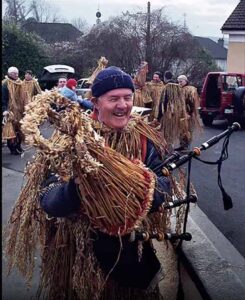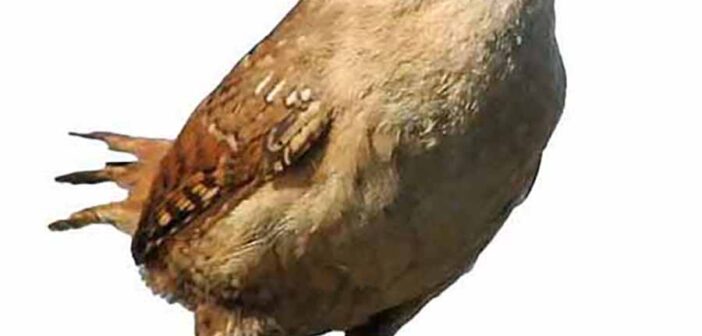
Saint Stephen’s Day, the feast of Saint Stephen, the first Christian martyr, is associated with the wren, an dreoilín, and house visiting, where groups of mostly young men go from house to house reciting rhymes and performing basic dramas with music, song, and dance. The Wren Boys tradition is popular throughout much of Ireland, except for the north east, where they are replaced by Mummers and Rhymers. It is still practiced today, with a focus on children’s groups rather than young men, and is seeing a revival in urban areas.
A wren character was incorporated in in Mummers plays, which began in the 17th century in the eastern half of Ireland. perform simple plays with various characters, ranging from district to district and influenced by Gaelic folk drama. Up to a dozen players take part, each of whom recites a rhyme. The longest of these is the preserve of the ‘Captain’ or leader of the troupe who introduces two chief protagonists, often involving a conflict between an English figure (Prince George) and a native Irish figure (typically Saint Patrick). A jester figure concludes by entertaining the audience and collecting payment.
These are some customs as recorded in the schools folklore collection in 1938:
- All the young boys disguise themselves with false faces and ragged clothes. They go around from house to house to hunt the wren. The leader goes first with the dead wren tied on to a stick and on arriving at every house they say: ‘The wren, the wren, the king of all/ birds/ St Stephen’s Day he was caught in the/ furze,/ Although he is small his family is great/ Rise up young ladies and give us a/ thrate,/ And if your thrate is of the best/ I hope in Heaven your soul will rest,/ So up with the kettle and down with/ the pan/ Give us an answer and we’ll be gone.’ (Tobercurry, Sligo)
- On St Stephen’s Day boys and girls go around from house to house collecting money. They do this for the purpose of burying the wren. When they go into a house they sing songs: ‘I hunted my wren through frost and/ snow/ I hunted my wren through miles and/ more,/ I hunted my wren through holly and/ lish/ And I brought him home in a holly/ bush,/ This is the wren as you may see/ Well dressed upon a holly tree,/ I brought the wren to visit ye here/ I wish ye all a Happy Christmas and/ a Merry New Year/ And when it comes it brings good/ cheer.’ / (Clashnagarrane, Kerry)
- On St Stephen’s Night, the young men of this district start mumming. They meet at a fixed place and dress up in old clothes and put on false faces so that people will not recognise them. They bring a musical instrument with them such a French fiddle or a melodeon and they act, sing and dance in each house. One acts as ‘Prince George’ and others as ‘The Doctor’, ‘The Wren’, ‘Joe Butcher’ and so on. Each one has a different rhyme. Nearly everybody gives them a shilling. They go round until the sixth of January and on that night they divide the proceeds equally. Sometimes if they have enough money they get up a party and dance. (Ballyboghil, Dublin)
- “Going out in the Wren” is still practised: only young boys now go out in the wren but formerly grown men did the same. Now the boys go in batches or singly. If they can manage to catch a wren they dress him up in ribbons, put him into a small box also arrayed in ribbons and bring him round with them. But if they can’t get a wren they stick feathers in a small ciarán of turf and this does instead. They disguise themselves -thats an essential part of the game. There is no particular sort of disguise. They go from house to house getting money in each house. Sometimes batches of boys from 16 to 20 years do the rounds. These have often tin whistles or sometimes melodeons or mouth organs. (Clocher Co mayo)
- St Stephens day comes on the day following Christmas day. It is usually called wren boy’s day, as it is a customary thing for boys to hunt the wren, kill her, and hang her on a stick. Then they dress in disguise, one dressed like a captain and a sword in his hand, another is dressed like a girl and a fool’s cap on him and he is called a fool, there is another boy who has a stick which the wren is hanging on, and there is a boy who carries the money-box, and there are a few boys chosen to play the music and another few to dance. Then they go from house to house and at each door they play a tune and dance a step and the people of the house give them money, and if they do not get money they burry the wren at the doorstep and it is said the people of that house will have bad luck during the year. In some districts they would not get money unless they had a wren and in other districts it is reckoned as cruelty. When night comes they divide the money equally among themselves and the buy some refreshments for themselves such as sweets apples oranges chocolate and buns. The ones who are drinking buy drink. The reason why the wren is hunted is because when St Stephen was hiding in the yew tree, and the soldiers stop to look for him, the wren chippered very loudly around the tree, which made the soldiers stop to look, and so they got him and stoned him to death and from then on she is punished. (Drumkeelanmore, Co Leitrim)
- On the Wren’s Day I got up early to go out with the wren. Mick Joe McKenna and myself got ready to go out. I put on a skirt, an old blouse and a hat and I dressed it all over with ribbons. Then I put on an [?] so that the other boys didn’t know me. We started after first mass and travelled away until we came to the first house. Then we started the “Wren Song”: The wren, the wren, the king of all birds,/ St Stephen’s Day was caught in the furze./ Up with the kettle and down with the pan, / Give us our answer and let us begone/ And if the money is anyway slack/ Give us a cut of your barm-brack./ So we travelled all day long, until night fall. When we were finished we had made six and sixpence. After my supper I got ready and went to the pictures. The pictures were very good. When the pictures were over I came home and went to bed, so I enjoyed the “Wren’s Day” very much.
- About two weeks before Christmas the “Mummers” call at the houses in the district. Then they continue calling to different houses until Christmas day. They always come at night. They are grown up boys from the neighborhood. They are dressed in white and wear false faces and hats with ribbons of every colour [color?], and some of them wear straw hats. They say rhymes such as: Room, room gallant room/ Give us room to rhyme/ And we’ll show you some activity/ Upon a Christmas time/ For Christmas comes but once a year/ When it comes it brings good cheer/ Here comes I wi’divil [?] a doubt/ If there was twelve in I could/ Knock twenty four out./ Here comes I Jack straw/ Such a man you never saw/ Through a rock through a reel/ Through an old shining wheel/ Through a bag of water, through a miller’s hopper/ Through an old man’s shin shank bone./ Here comes I wee fiddelty funny/ I am the man who carries the money/ Money I want and money I crave/ If you don’t give me money, I will sweep you all to the / grave./ Here comes Beelzebub,/ I am the man that carries the club,/ In my hand a dripping pan/ And you’ll surely find me a jolly wee man./ Here comes I wee Doctor Brown/ I am the best wee doctor in the town./ The mummers never come after Christmas. The people in this district have the feast on Christmas Day.
- About two weeks before Christmas the “mummers” call at the houses in this district. Then they continue calling to different houses until Christmas day. They always come at night. They are grown up boys from the neighborhood. They are dressed in tall hats with ribbons, false faces and old clothes. There is a captain, a doctor a knight and Jack Straw in the band. The captain first enters the house and introduces his band with this rhyme. Room, Room for gallant boys,/ Room to act and room to cheer./ Coming round the Christmas time/ When it comes it brings good cheer/ Pockets full of money and bottles/ full of beer./ We wish you all a Happy Christmas / And a bright New Year./ If you don’t believe what I say enter in “Green Knight.” Then a young man enters in and repeats his rhyme. When each one of the band has done his part, the woman of the house drops a coin in the box which the captain carries. The band usually gets ten shillings all together. They hold a dance in a local hall or house and invite all their friends. They spend the money in buying supper for their friends. In this district the Christmas feast is held on Christmas day and there is a turkey or a goose for dinner with plum pudding after. The second day of Christmas is St. Stephen’s Day. It is also known as boxing day. People keep this day a fast day to keep infectious diseases away. In other parts of Ireland on St. Stephen’s Day boys travel round in bands gaily dressed. They are known as “wren boys.” Shop keepers in this district give presents to their customers at Christmas. They give tea sweets and a cake. (Ballymagrorty, Co. Donegal)
- On St Stephens day many of the local boys go from house to house as “Wren Boys”. At each house they recite a poem. Here are some of them. Mr is a worthy man/ And to his house we brought the “Wran”/ The “Wran” the “Wran” as you may see is/ guarded up on a holly tree/ A bunch of ribbons by his side/ And the “Wran Boys” to be his bride/ Haray me boys Haray./ O Dreoilín. Ó Dreoilín where is your nest?/ It is in the wood that I love the best/ Under the holly and ivy tree./ Where the “Wran Boys” came hunting me/ They hunted me up and they hunted me down./ And in the wood they knocked me down/ Haray me boys haray./ On Christmas day I turned the spit/ I burned my finger and I feel it “yit”/ Between my finger and my thumb/ Came a big blister as big as a plum./ I have a small box under my arm/ And a few pence will do it no harm/ If you fill it of the best/ I hope, in Heaven your soul may rest/ But if you fill it of the small/ I won’t agree with the “Wran Boys” at all/ So up with the “kittle” and down with the pan/ Give us your answer and let us be gone/ Haray me boys haray./ The “Wran” the “Wran” , the King of all birds/ On St Stephens Day she was caught in the firs/ So up with the “kittle” and down with the pan/ Give us a penny or tuppence to bury the “Wran”./ he “Wran” the “Wran” the King of all birds/ On Stephens Day she was caught in the firs/ Mrs ______ is a lady. Mr _____ is a gentleman/ To your house we brought the Wran/ We dipped her head in a barell of beer/ We wish ye all a Happy New Year/ So up with the kittle and down with the pan/ And give us a penny or two to bury the Wran (Mulhuddart, Co Dublin)
- The Wren-boys’ Rhyme./ The Wren, the Wren, the King of all birds,/ St. Stephens day got caught in the furs./ Although he is little his honour is great,/ Put your hand in your pocket,/ And give me a treat./ Dreoilin, Dreoilin where’s your nest,/ In the bush that I love best./ Behind the Holly and Ivy tree,/ Where all the birds shall follow me./ Up with the poker and down with the thongs,/ Give me your answer and let me be gone./ A jar of whiskey and a barrel of Beer,/ I wish ye all a happy new year./ As I was going to Killalawn,/ I saw a Wren (up) upon a wall./ I up with my stick and I knocked him down,/ And I brought him up to sweet Fiddown./ I have an old box under my arm,/ A couple of coppers will do you no harm,/ I know this woman is a very good woman,/ She’ll give me a penny to bury the Wren./ (Faithlegg Waterford)
- These are the Rhymes which the Mummers recite when they go round the parish at Christmas. When they go out they are dressed in white shirts, (worn over their ordinary clothing) green or red sashes, paper hats decked with long paper ribbons which hang downwards concealing their faces and other apparel according to the character they are playing. When they came to a house the first man who is called ‘Room’ raps loudly on the door and shouts, ‘Any admittance for Mummers?’ The door is opened and ‘Room’ with a stick in his hand dashes in and walks round the room sweeping everything out of the way with his stick and shouting: Room, Room, give me room,/ Room to act, room to rhyme,/ It is coming up to Christmas time,/ Christmas comes but once a year,/ And when it comes in it brings good cheer,/ And if you don’t believe what I say,/ Enter the captain and he’ll soon clear the way. (Cill Bharainn, Dún na nGall)




